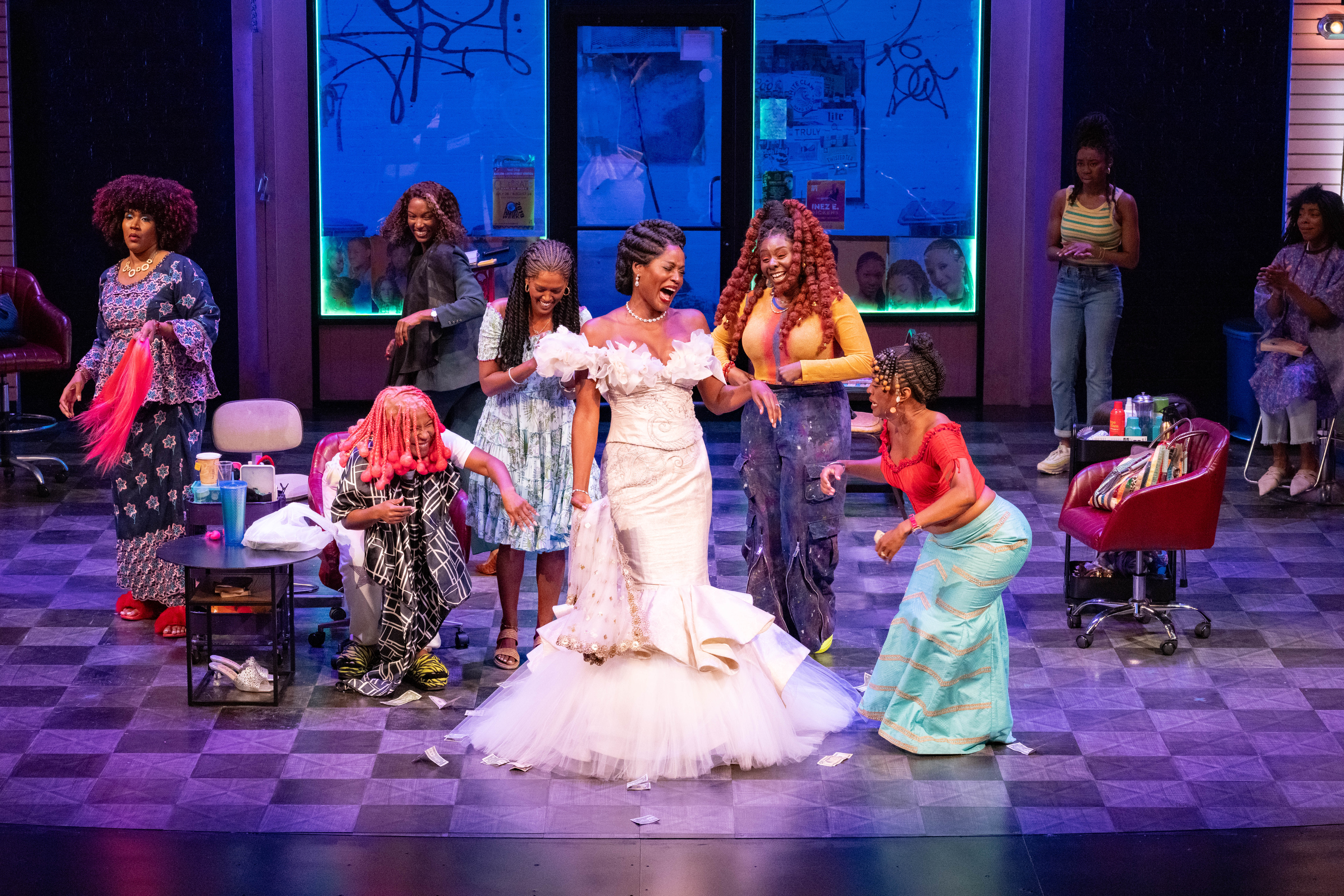‘Jaja’s African Hair Braiding’ Review: The Mark Taper Forum Has an Ensemble Comedy Rich and Rewarding Enough to Merit Extensions

If ever a play seemed tailor-made for the Mark Taper Forum stage, at least in the 2020s, it’s *Jaja’s African Hair Braiding*. The most intimate of the three Music Center theaters in downtown L.A. is clearly upholding its mandate to do programming that represents a broader range of cultures. But at 739 seats, the Taper is hardly so small that it can afford to skip its mandate to entertain the traditional theater audience.
How sweet it is, then, to witness how delightfully *Jaja* fills that sweet spot where cultural specificity and undeniable mainstream appeal collide. It feels good to hear the laughter of Black women during some of the earliest scenes, at references that only someone who’s been to a braiding salon is likely to get. It feels even better when the entire audience has joined in, as they quickly and loudly do—since no foreknowledge of cornrows or passion twists is really required.
It’s the kind of show that nearly anyone who walks in is going to find captivating, with or without an appointment.
Playwright Jocelyn Bioh’s dramatic comedy opens with two of its characters, Marie (Jordan Rice), the 18-year-old daughter of the shop’s proprietor, and Miriam (Bisserat Tseggai), an only slightly older employee from Sierra Leone, bringing the gate up at their Harlem salon. Even before the shop’s other daily habitués join them to fill out the ensemble, you may immediately be thinking: Why is there not a Tony Award for best hair?
Oh wait—there is, or at least was, for once, as the Broadway version of this play won a “special” Tony in 2024 for hair and wig design.
Fortunately, *Jaja* has even more going for it than follicular eye candy, as seen in the several other categories in which the New York production received Tony nominations, including Best Play and Best Direction (and a win for costume design). What it had going for it in the Broadway production is fully in evidence in this stop at the Taper, which comes at the end of a national tour, also directed flawlessly by Whitney White.
The whole cast is as on fire as if they were just opening that gate for the first time; they’re doing their own wonderful weave every night.
These two introductory characters are joined by three more braid-makers who are always a tight unit after all, despite all they have in common as immigrants.
The most contentious is Bea (Claudia Logan), a Ghanaian émigré who has a big chip on her shoulder over how the yet-to-be-seen Jaja started this shop without her coming in as a co-owner, partly due to their differing financial situations. Bea also has a big beef with her fellow employee Ndidi (Abigail C. Onwunali), a Nigerian immigrant whose pleasant attitude and possibly superior braiding skills have caused some customers to shift loyalties and head for her chair.
Somewhere in the middle of the mild-mannered-to-aggressive scale is the sexy Aminata (Tiffany Renee Johnson), the only one fiery enough to be friends with Bea and meet her at her level—although Bea’s stream of grievances eventually become obnoxious enough to test even Aminata’s loyalty.
As for the seemingly shy Miriam, it takes a while for her flame to become evident, but the tale she tells a customer about the circumstances of her leaving Sierra Leone suggests that she might be the toughest of all these cookies.
Marie, who is sort of the young maître d’ of the shop, will never be anything other than the voice of calm and reason. She is the most innately Americanized of this bunch and someone who had to learn not to stand out, attending a private school far away from all this immigrants’ loose talk.
As for Marie’s mother, the Senegalese shop owner, we have to wait almost as long for Jaja (Victoire Charles) to show up in the play named for her as we have to wait for Godot in his. But turn up she does, in the final third—wearing a wedding dress. Did we mention she’s getting married today? That dress feels like an eighth wonder of the world when you first catch sight of it. (No one need guess why the show won that costuming Tony.)
When Jaja finally appears for one long scene late in this one-acter, she does almost as much talking as any of the others, coming off as rude but also giddily excited for her impending matrimony, which she may not be heading into for strictly romantic reasons.
There’s a good reason the *Barbershop* movie turned into a whole film and television franchise in the 2000s and 2010s: a hair care setting is ideal for a workplace comedy or comedy-drama because of the possibilities for friends or strangers to drop in and act as audience surrogates or conversational foils.
It’s surprising that a salon of this sort hasn’t been much used as a milieu before now, because one thing that’s different from a dudes’ place, especially, is that when someone settles into those chairs for as intricate a process as this, they’re going to be there pretty much all day. So Bioh doesn’t have to come up with contrived excuses to keep the supporting characters hanging around for a long spell in this day-in-the-life play.
Well, the female supporting characters tend to be in it for the duration, anyway. Not so much the men or the man. The male characters who pop into the shop have such short turns at bat in the action that you wonder if the production can really afford to keep on so many guys with so little to do.
Until it dawns on you that, ohhhh—maybe it’s the same guy. The Playbill and, of course, the curtain call confirm your suspicion: It’s Michael Oloyede playing all these specimens of manhood in chameleonic fashion. (He is the one holdover here from the original Broadway production.)
The comedy in the show is fairly relentless, up to a point. To say that it feels like the stuff of a sitcom for a good while is not an insult; it feels like a situation comedy you’d want to watch play out every week.
This is a world in which we can laugh not just with the characters’ interpersonal foils but at some of their clients’ delusions—like the woman who is sure that her golden rows are turning her into a dead ringer for Beyoncé, even if it takes a hilariously herculean effort to flip that half-ton of hair from one shoulder to the other.
But, of course, it’s not a total surprise that Bioh has something more serious on her mind than just letting basic female bonds and rivalries play out.
You can more or less guess that Bea, however rough and unfairly domineering she is, will get some redemption or at least not go down as the villain of the piece. The real adversary, off-stage, of course, is a society that is not as welcoming of immigrants as these women assume or hope, even with the womblike enclave of Harlem as a seeming buffer.
So, yes, it’s going to go darker toward the end, though not so much so that it feels like all the laughs you’ve already expended are being pulled back from you.
Interestingly, *Jaja* is the second major production in L.A. this fall that is set as a period piece in the late 2010s. Naturally, that’s not an arbitrary choice. In the case of the other such show, *Eureka Day* at the Playhouse, it’s because the vaccination themes would only make sense pre-COVID, not post. In the instance of *Jaja’s African Hair Braiding*, it’s because the women’s lack of complete panic as immigrants would not make sense during the second Trump term. It’s set during the first, before that administration made the administration of terror a proud hallmark.
It’s sad to think that any playwright who wants to do a contemporary play in which urban characters are not deeply weary or living in abject fear will forever be setting their narratives in a time a little bit before the present one. But there we have it, for now.
The bittersweetness that ultimately characterizes *Jaja* doesn’t mean that it isn’t still fizzy. There’s not just effervescence but serious joy in this show—an exuberance you’re maybe not meant to think can or will last forever, but this blisteringly hot day in Harlem sure makes for a cool breeze of a night at the theater while it lasts. And that’s a lovely relief from feeling cold as ICE.
I’d like to say that its appeal is so universal it’s a show even a newly hired immigration agent could love, but all theater has some limits to its appeal. *Jaja* really doesn’t feel like it has many.
https://variety.com/2025/legit/reviews/jajas-african-hair-braiding-mark-taper-forum-theater-review-1236555077/








